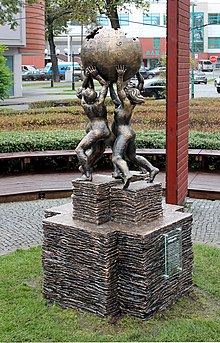
Back التحيز بين الجنسين على ويكيبيديا Arabic Vikipediyada gender bərabərsizliyi AZ Gender bias sa Wikipedia BCL উইকিপিডিয়ায় লিঙ্গ পক্ষপাত Bengali/Bangla Biaix de gènere a la Viquipèdia Catalan لایەنگریی ڕەگەز لە ویکیپیدیا CKB Genderová nevyváženost na Wikipedii Czech Geschlechterverteilung in der Wikipedia German Προκατάληψη των φύλων στη Βικιπαίδεια Greek Brecha de género en Wikipedia Spanish

Gender bias on Wikipedia is a term used to describe various gender-related disparities on Wikipedia, particularly the overrepresentation of men among both volunteer contributors and article subjects, as well as lesser coverage of and topics primarily of interest to women.[3][4]
In a 2018 survey covering 12 language versions of Wikipedia and some other Wikimedia Foundation projects, 90% of 3,734 respondents reported their gender as male, 8.8% as female, and 1% as other; among contributors to the English Wikipedia, 84.7% identified as male, 13.6% as female, and 1.7% as other (total of 88 respondents).[5] In 2019, Katherine Maher, then CEO of Wikimedia Foundation, said her team's working assumption was that women make up 15–20% of total contributors.[6]
A 2021 study found that, in April 2017, 41% of biographies nominated for deletion were women despite only 17% of published biographies being women.[7] The visibility and reachability of women on Wikipedia is limited, with a 2015 report finding that female pages generally "tend to be more linked to men".[8][needs update] Language that is considered sexist, loaded, or otherwise gendered has been identified in articles about women.[4] Gender bias features among the most frequent criticisms of Wikipedia, sometimes as part of a more general criticism about systemic bias in Wikipedia.
In 2015, Wikipedia co-founder Jimmy Wales announced that the encyclopedia had failed to reach its goal to retain 25% female editorship.[3] Programs such as edit-a-thons and Women in Red have been developed to encourage female editors and increase the coverage of women's topics.[9][10]
- ^ "Wikipedia monument to be built in Poland". The Independent. 10 October 2014. Retrieved 26 June 2020.
- ^ Ronson, Jacqueline (22 October 2015). "Wikipedia Monument in Słubice, Poland Celebrates First Anniversary". Inverse. Retrieved 26 June 2020.
- ^ a b Torres, Nicole (2 June 2016). "Why Do So Few Women Edit Wikipedia?". Harvard Business Review. ISSN 0017-8012. Retrieved 26 June 2020.
- ^ a b Kleeman, Jenny (26 May 2016). "The Wikipedia wars: does it matter if our biggest source of knowledge is written by men?". www.newstatesman.com. Retrieved 26 June 2020.
- ^ "Community Insights/2018 Report/Contributors - Meta". meta.wikimedia.org. Retrieved 28 September 2020.
- ^ Balch, Oliver (28 November 2019). "Making the edit: why we need more women in Wikipedia". The Guardian. ISSN 0261-3077. Retrieved 26 June 2020.
- ^ Tripodi, Francesca (2021). "Ms. Categorized: Gender, notability, and inequality on Wikipedia". New Media & Society. 25 (7): 1687–1707. doi:10.1177/14614448211023772. S2CID 237883867.
- ^ Wagner, Claudia (2015). "It's a Man's Wikipedia? Assessing Gender Inequality in an Online Encyclopedia". arXiv:1501.06307 [cs.CY].
- ^ Curtis, Cara (2019). "This physicist has written over 500 biographies of women scientists on Wikipedia". thenextweb.com. The Next Web. Archived from the original on 4 August 2019. Retrieved 10 June 2019.
- ^ Wade, Jessica (11 February 2019). "This is why I've written 500 biographies of female scientists on Wikipedia". The Independent. Archived from the original on 20 May 2019. Retrieved 25 February 2020.